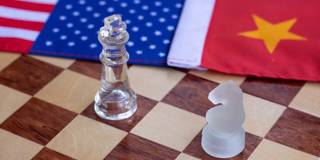At its founding in the aftermath of World War II, the United Nations was conceived above all as the guardian of a rules-based multilateral order that would ensure peace. Today, the UN must play a more active guardianship role – and help prevent another costly and potentially catastrophic superpower conflict.
WASHINGTON, DC – When world leaders gather in New York later this month for the annual United Nations General Assembly meetings, they will have much to discuss besides climate change and sustainable development. In particular, the escalating superpower rivalry between the United States and China poses a growing risk to the world. The UN must therefore make helping to avoid another Cold War central to its mission today.
Amid all the debate regarding the demise of multilateralism and the emergence of a G2 world dominated by America and China, it is easy to forget that a similar system – featuring the US and the Soviet Union – existed for decades after World War II. Only in the late 1970s and 1980s did it become evident that the Soviet system could not compete with market capitalism. After the fall of the Berlin Wall in 1989 and the subsequent Soviet collapse, that G2 world gave way to a G1+n order in which all other countries (n) were unable to rival America as the sole global superpower.
The ensuing quarter-century was a period of liberal rules-based multilateralism. Democratic and market-based capitalism had seemingly triumphed in what Francis Fukuyama called “the end of history.” The US broadly championed this order – the 2003 Iraq War being a clear exception – and, like most countries, benefited enormously from globalization and the emergence of new complex value chains.

WASHINGTON, DC – When world leaders gather in New York later this month for the annual United Nations General Assembly meetings, they will have much to discuss besides climate change and sustainable development. In particular, the escalating superpower rivalry between the United States and China poses a growing risk to the world. The UN must therefore make helping to avoid another Cold War central to its mission today.
Amid all the debate regarding the demise of multilateralism and the emergence of a G2 world dominated by America and China, it is easy to forget that a similar system – featuring the US and the Soviet Union – existed for decades after World War II. Only in the late 1970s and 1980s did it become evident that the Soviet system could not compete with market capitalism. After the fall of the Berlin Wall in 1989 and the subsequent Soviet collapse, that G2 world gave way to a G1+n order in which all other countries (n) were unable to rival America as the sole global superpower.
The ensuing quarter-century was a period of liberal rules-based multilateralism. Democratic and market-based capitalism had seemingly triumphed in what Francis Fukuyama called “the end of history.” The US broadly championed this order – the 2003 Iraq War being a clear exception – and, like most countries, benefited enormously from globalization and the emergence of new complex value chains.